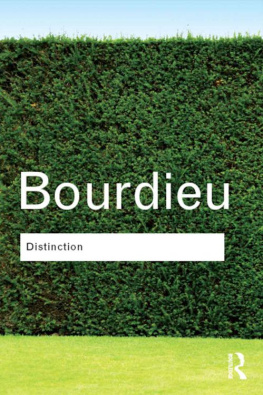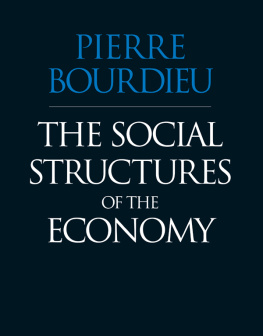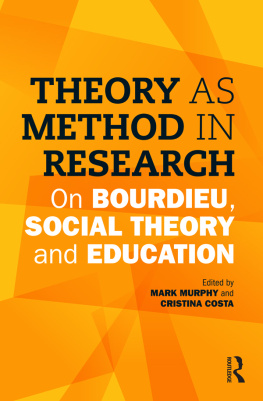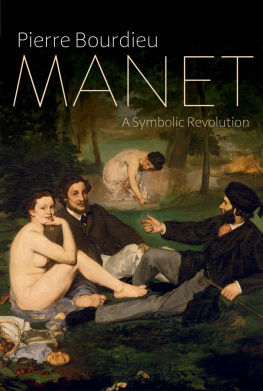Distinction
In this rich and probing guide to the strategies of pretension in contemporary France, Bourdieu describes how class segments separate from each other by their contrasting attitudes towards art and beauty.
The Observer
Full of insights of fundamental importance.
Tom Gretton, Oxford Art Journal
Brilliant insights... richly informative and insightful.
Barry King, Reviewing Sociology

Routledge Classics contains the very best of Routledge publishing over the past century or so, books that have, by popular consent, become established as classics in their field. Drawing on a fantastic heritage of innovative writing published by Routledge and its associated imprints, this series makes available in attractive, affordable form some of the most important works of modern times.
For a complete list of titles visit
www.routledge.com/classics
Pierre
Bourdieu
Distinction
A Social Critique of the Judgement of Taste
Translated by Richard Nice, with a new introduction by
Tony Bennett

First published in French as La Distinction, Critique sociale du judgement
by Les Editions de Minuit, Paris
This translation first published 1984 by Routledge Kegan & Paul
First published in the Routledge Classics 2010 by Routledge
2 Park Square, Milton Park, Abingdon, Oxon, OX14 4RN
Routledge is an imprint of the Taylor & Francis Group, an informa business
1984, 2010 the President and Fellows of Harvard College and Routledge
Typeset in Joanna by RefineCatch Limited, Bungay, Suffolk
All rights reserved. No part of this book may be reprinted or reproduced or utilized in any form or by any electronic, mechanical, or other means, now known or hereafter invented, including photocopying and recording, or in any information storage or retrieval system, without permission in writing from the publishers.
British Library Cataloguing in Publication Data
A catalogue record for this book is available from the British Library
Library of Congress Cataloging in Publication Data
A catalog record for this book has been requested
ISBN 10: 0415567882 (pbk)
ISBN 13: 9780415567886 (pbk)
CONTENTS
TABLES
FIGURES
ILLUSTRATION CREDITS
Russell Lee, Farm Security Administration, 37; ELF-AQUITAINE, 38; Piet Mondrian, Broadway Boogie Woogie, 194243. Collection, The Museum of Modern Art, New York, 43; Piet Mondrian, Painting I, 1926. Collection, The Museum of Modern Art, New York. Katherine S. Dreier Bequest, 43; Gino Severini, Dynamic Hieroglyphic of the Bal Tabarin, 1912. Collection, The Museum of Modern Art, New York. Acquired through the Lillie P. Bliss Bequest, 44; X. Lambours, Viva, 141; H. Gloaguen, Viva, 141; X. Lambours, Viva, 144; F. Hers, Viva, 144; C. Raimond-Dityvon, Viva, 144; C. Raimond-Dityvon, Viva, 145; H. Gloaguen, Viva, 145; P. Guis, Rapho, 162; R. Doisneau, Rapho, 162; Arnaud Legrain, Viva, 162; M. Delluc, Viva, 163; C. Raimond-Dityvon, Viva, 163; P. Michaud, Rapho, 163; Air France, 189; J. P. Verney, Ministre de lAgriculture, 189; P. Bringe, Ministre de lAgriculture, 189; C. Raimond-Dityvon, Viva, 189; Chambre de Mtiers de la Meuse, 189; R. Doisneau, Rapho, 189; C. Raimond-Dityvon, Viva, 198; Prospectus de Sculpture humaine, 207; Tennis-magazine/Sygma, 207; M. Delluc, Viva, 240; Esalas Baitel, Viva, 240; A. Dagbert, Viva, 240; D. de Saint-Sauveur, Le Figaro-Magazine, 265; Documentation Sminarc, 3056; R. Doisneau, Rapho, 313; Maison et Jardin, 313; C. Raimond-Dityvon, Viva, 374; C. Raimond-Dityvon, Viva, 378; Y. Jeanmougin, Viva, 378; La Republique des Pyrenees, 384; Y. Jeanmougin, Viva, 386; C. Raimond-Dityvon, Viva, 386; C. Raimond-Dityvon, Viva, 457.
If any proper acknowledgement has not been made, we would invite copyright holders to inform us of the oversight.
PREFACE TO THE ENGLISH-LANGUAGE EDITION
I have every reason to fear that this book will strike the reader as very Frenchwhich I know is not always a compliment.
French it is, of course, by virtue of its empirical object, and it can be read as a sort of ethnography of France, which, though I believe it shows no ethnocentric indulgence, should help to renew the rather stereotyped image of French society that is presented by the American tradition. But I believe it is possible to enter into the singularity of an object without renouncing the ambition of drawing out universal propositions. It is, no doubt, only by using the comparative method, which treats its object as a particular case of the possible, that one can hope to avoid unjustifiably universalizing the particular case. With the aid of Norbert Eliass analyses, I do indeed emphasize the particularity of the French tradition, namely, the persistence, through different epochs and political regimes, of the aristocratic model of court society, personified by a Parisian haute bourgeoisie which, combining all forms of prestige and all the titles of economic and cultural nobility, has no counterpart elsewhere, at least for the arrogance of its cultural judgements. It would, however, be a mistake to regard all that is said here about the social uses of art and culture as a collection of Parisian curiosities and frivolitiesand not only because, as Erving Goffman once pointed out to me, the Parisian version of the art of living has never ceased to exert a sort of fascination in the Anglo-Saxon world, even beyond the circle of snobs and socialites, thereby attaining a kind of universality.
The model of the relationships between the universe of economic and social conditions and the universe of life-styles which is put forward here, based on an endeavour to rethink Max Webers opposition between class and Stand, seems to me to be valid beyond the particular French case and, no But, more broadly, the sense of distance, even strangeness, which scientific objectification itself produces and which is intensified by the differences in historical traditions, giving different contents to different realizations of the same structures, must not prevent the reader from reflecting onto his own society, onto his own position within it, in short, onto himself, the analyses he is offered.
That is why, though I am aware of the dangers of a facile search for partial equivalences which cannot stand in for a methodical comparison between systems, I shall take the risk of suggesting, within the limits of my knowledge of American society and culture, some guidelines for a reading that seeks to identify, behind the specific institution of a particular society, the structural invariant and, by the same token, the equivalent institution in another social universe. At the level of the international pole of the dominant class the problem scarcely arises, since the cultural products are (relatively) international. One could replace Les Temps Modernes by Partisan Review, while the New York Review of Books would (alas) represent an unlikely combination of the weekly Nouvel Observateur, the review Critique and, especially in its successive enthusiasms, the journal Tel Quel. As regards bourgeois taste, the American professionals, executives and managers might ask of the film, book, art and music critics of the
Next page








